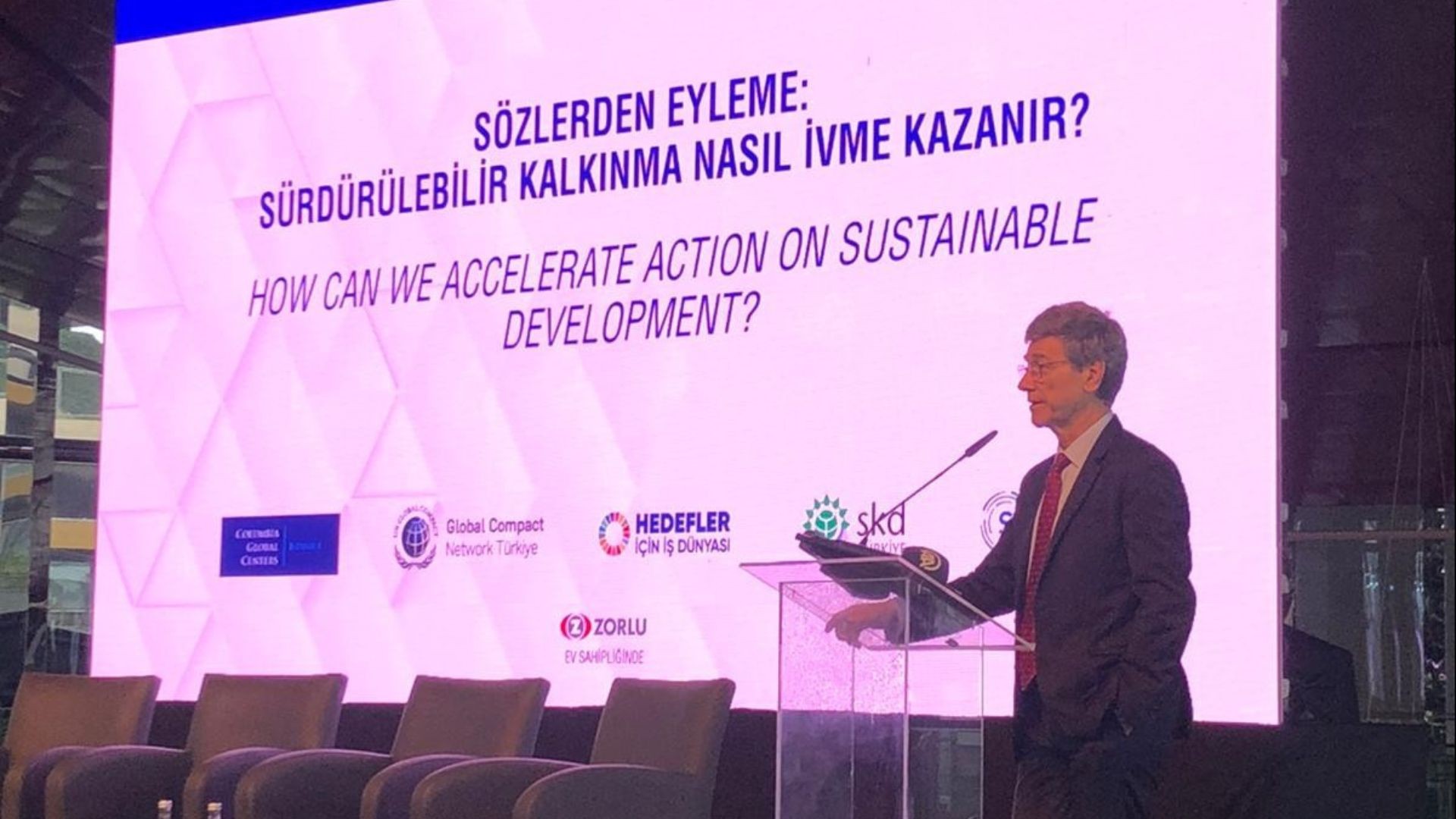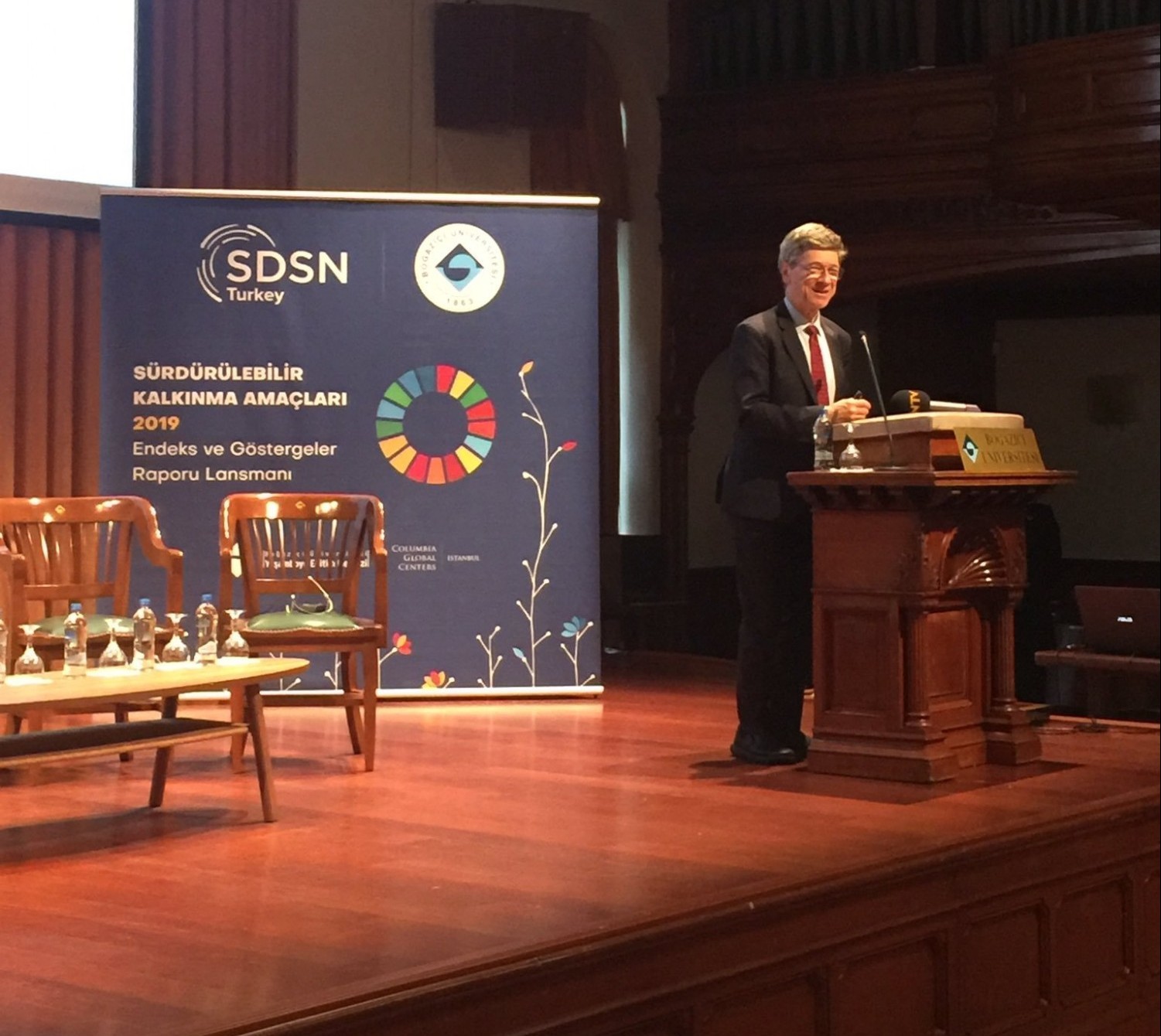Jeffrey Sachs talks about Sustainable Development in Istanbul

“Economies are destroying nature without any ability of self-control...we’re facing calamitous ecological crises. We know it, the scientists tell us; we feel it; we see it; and we are simply unable to act.”
Jeffrey Sachs
On November 1, Jeffrey Sachs, University Professor and Director of the Center for Sustainable Development at Columbia University, and Director of the UN Sustainable Development Solutions Network (SDSN), visited Istanbul to talk about the urgent need to address and cooperate on sustainable development.
Hosted by TÜSİAD, Turkey's top business organization, in collaboration with Columbia Global Centers | Istanbul, UN Global Compact Network Turkey, Business for Goals, and SDSN Turkey, Jeffrey Sachs gave a speech titled, “How can we accelerate action on sustainable development?”
Professor Sachs focused on two dynamics that are affecting our globe: instability and the destructive nature of today’s economies. He gave examples of the unrest in Chile and Hong Kong, and mass shootings in the US, to show the instability and fragility of the world right now. Today’s economies are negatively affecting the climate, creating mass pollution, and reducing biodiversity. He called attention to the fact that the climate today is 1.1 degrees Celsius higher than it was at its pre-industrial level, and that we are not prepared to combat this. He talked about the pollution that is damaging the Black Sea from heavy industry in Russia and Central Europe, shipping, and over-fishing. Species are going extinct due to global warming, deforestation for farming and construction, and chemical pollutants.
In short, we are suffering from major crises but are not working hard enough to find solutions for them. Though Professor Sachs applauded governments for signing onto the UN’s 17 Sustainable Development Goals (SDGs) and the Paris Climate Agreement, he was quick to say that they are not living up to their words.

So, what can we do? Professor Sachs simplified the 17 SDGs and Paris Climate Agreement down to six major areas of focus:
- Good education, science and technology for every society: Countries should check their education system to ensure that all children are included, good science and technology are being taught, and that higher education institutions being looked after.
- Health: Countries should ensure there is access to good healthcare, and that people are living a healthful life.
- Decarbonizing the energy system: Countries should look at their plan to decarbonize their energy system, clean up their industrial waste, and look towards renewable energies.
- Sustainable land use: Countries should be protecting nature, and looking at the air quality of their cities.
- Urban settlements: Countries should look after the healthfulness of the cities, including the air quality of their cities.
- Information technology: This is the essential new tool of our era that can be used for good.
Professor Sachs then told the audience that Turkey should have strategies for these six areas by using a multi-stakeholder approach with the government, private sector, academia, and civil society. He noted that it is important to have regional cooperation, and not just national solutions, and concluded by saying that “we have signed up to the goals because our lives depend on them.”
In the afternoon, Professor Sachs spoke on “Achieving the SDGs in Turkey and the West Asian Region” at Boğaziçi University in collaboration with Columbia Global Centers | Istanbul and Boğaziçi University’s SDSN Turkey network. He presented the SDG 2019 Index and Indicators Report, and spoke about the importance of the metrics to measure the performance of SDGs around the world. He showed how Turkey performed on each of the sustainable development objectives, ranking 79 out of 162 countries on the SDG index. He then urged SDSN Turkey to play a more active role in developing these indices locally and to work with other SDSN networks in the region.